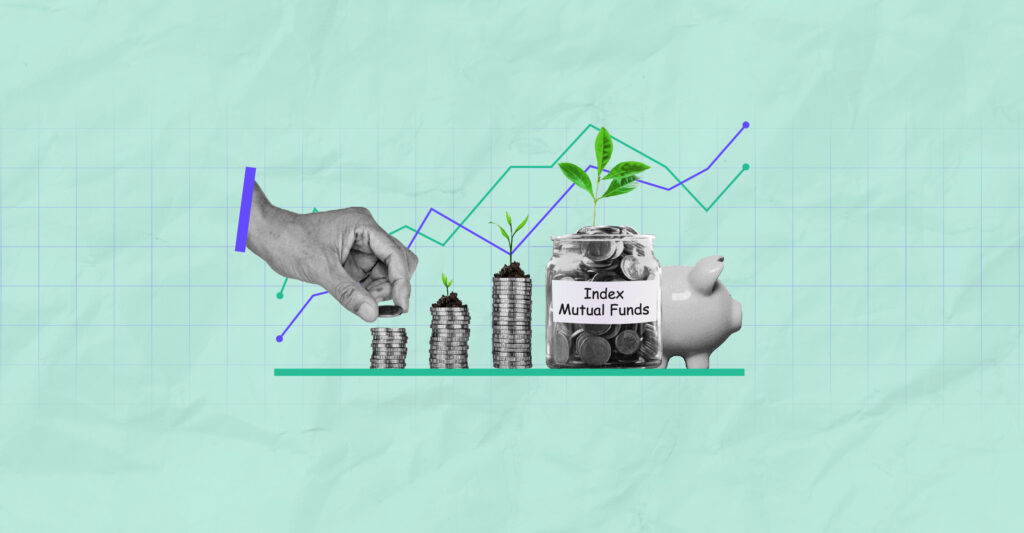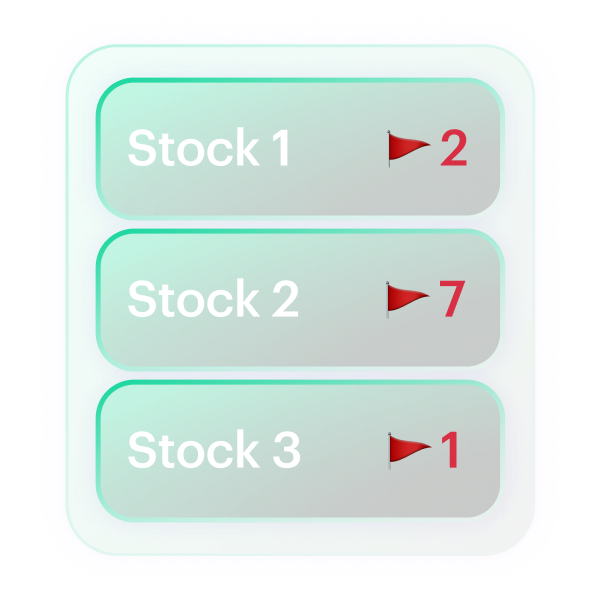Last Updated on Apr 25, 2025 by vanessa sequeira
One of the ways of replicating a benchmark index in your investment portfolio is by investing in index funds. These are mutual funds with a portfolio curated to match or track a stock market index, such as Nifty 50. What are the benefits of such funds, should you invest in them, and what are the best index funds in India? Let’s find out in this article.
Table of Contents
Best Index Funds in India
| Name | AUM (Cr) | CAGR 3Y (%) | Expense Ratio (%) | Volatility (%) | Tracking Error (%) |
| SBI Nifty Index Fund | 9,192.42 | 13.24 | 0.22 | 14.97 | 0.01 |
| SBI Nifty India Consumption Index Fund | 331.47 | 0.00 | 0.4 | 16.43 | 0.02 |
| HDFC Nifty100 Quality 30 Index Fund | 192.08 | 0.00 | 0.4 | 16.50 | 0.02 |
| SBI Nifty 500 Index Fund | 809.13 | 0.00 | 0.39 | 16.61 | 0.02 |
| HDFC Nifty LargeMidcap 250 Index Fund | 445.13 | 0.00 | 0.25 | 17.18 | 0.03 |
| Motilal Oswal Nifty Capital Market Index Fund | 107.44 | 0.00 | 0.39 | 38.47 | 0.03 |
| Zerodha Nifty LargeMidcap 250 Index Fund | 824.54 | 0.00 | 0.27 | 17.46 | 0.03 |
| Edelweiss Nifty500 Multicap Momentum Quality 50 Index Fund | 177.78 | 0.00 | 0.4 | 23.34 | 0.03 |
| HDFC Nifty 50 Index Fund | 19,046.29 | 13.22 | 0.2 | 15.04 | 0.03 |
| UTI Nifty 50 Index Fund | 21,356.16 | 13.25 | 0.17 | 15.04 | 0.03 |
Note: The best index mutual funds in the above table are derived from Tickertape’s Mutual Fund Screener. The data is as of 25th April 2025, and the filters applied are:
- Category: Index Funds
- Plan: Growth
- Tracking Error: Sort from low to high
- Expense ratio
What Is An Index Fund?
An index fund is a type of mutual fund or ETF that invests in securities that are part of a benchmark index. For instance, UTI Nifty 50 Index Fund in India tracks the Nifty 50 index. So, it invests in all the stocks that the index holds in the same proportion.
Whenever the weightage of a stock in the index changes, the fund manager also replicates it in the fund. And if a particular stock is removed or replaced from the index, the fund manager will follow suit.
As such, the performance of the UTI Nifty 50 Index Fund is tied to that of the Nifty 50 index. And since they replicate the index they track, index funds are considered passive investments.
Features of Index Funds
- Diversification: Index funds automatically provide broad market exposure, as they hold a range of securities. For instance, investing in a Nifty 50 index fund allows investors to gain exposure to the 50 largest companies listed on the National Stock Exchange of India (NSE).
- Passive Management: Unlike actively managed funds, index funds are passively managed, meaning they don’t require frequent buying or selling of stocks. The fund manager’s job is to replicate the index’s holdings.
- Low-Cost Structure: The expense ratios for low-cost index funds are typically lower than those of actively managed funds. This is because there is less research and management involved in tracking an index.
Advantages of an Index Fund
Investing in the best index funds India comes with several advantages, particularly for long-term investors looking to grow their wealth efficiently.
- Cost Efficiency: One of the key benefits of index fund investments is their low cost. With fewer management fees and no need for constant monitoring, equity index funds are a more affordable investment option compared to actively managed funds.
- Market Performance: Top index mutual funds tend to perform similarly to the market or sector they track. This means they offer an easy way to invest in broad market segments and capitalise on overall market growth.
- Consistent Growth: Long-term index funds can offer steady, predictable returns, making them ideal for investors focused on long-term wealth building. Historically, equity indices have shown growth over long periods.
- Diversification: By investing in an index mutual fund, investors gain exposure to a large number of stocks, reducing the risk of a single stock’s poor performance affecting the overall portfolio.
- Tax Efficiency: Since there is less buying and selling of assets in passive investment funds, the capital gains taxes on index funds are often lower than those on actively managed funds.
Risks of Investing in Index Funds
While an index fund portfolio has many benefits, they are not without risks. Here are some potential downsides to be aware of:
- Market Risk: Index funds track the performance of market indices, meaning if the market or sector performs poorly, so will the index fund. There is no active manager to adjust the holdings in response to market downturns.
- Limited Flexibility: Investors in index funds are committed to holding the same stocks as the underlying index, even if certain stocks experience poor performance. This lack of flexibility can be a disadvantage during times of market volatility.
- Tracking Error: While rare, best performing index mutual funds may not perfectly track the index due to factors like management fees or the timing of trades.
- Concentration Risk: Some indices may have a concentration in particular sectors or stocks. For example, if an index has a significant portion of its funds in the technology sector, any downturn in that sector could impact the fund’s performance.
Who Should Explore Index Funds?
Index funds are an excellent choice for certain types of investors, but they may not be suitable for everyone.
- Long-Term Investors: If you’re looking to build wealth over a long period, long-term index funds provide an opportunity for growth with a relatively low level of risk.
- Cost-Conscious Investors: If minimising fees is a priority, low-cost index funds can be an attractive option. These funds allow you to keep costs down while investing in a diversified basket of stocks.
- Passive Investors: Those who prefer a hands-off investment approach will appreciate passive investment funds. Investors don’t have to worry about constant monitoring or making active investment decisions.
How to Choose Index Funds
When choosing the right index funds with high returns for your investment strategy, consider the following factors:
- Index Selection: The first step is deciding which index you want to invest in. Popular choices include the Nifty 50 index funds, which track the top 50 companies in India, and the Sensex index, which tracks 30 major stocks.
- Expense Ratio: Look for low-cost index funds with a competitive expense ratio. This can have a significant impact on your returns over the long term.
- Performance History: While past performance is not always indicative of future results, looking at the best performing index mutual funds can give you an idea of how the fund has performed relative to its benchmark index.
- Investment Goal: If you are looking for regular income, the best index funds for SIP might be suitable, as these funds can help you accumulate wealth over time through systematic investments. If your focus is growth, look for the best index funds for growth, which typically target growth-oriented sectors.
- Fund Size and Liquidity: Consider the size and liquidity of the fund. Larger funds tend to have better liquidity and may be more efficient in tracking the index.
Factors To Consider Before Investing In The Best Index Mutual Funds
- Time: Like most passive investments, index funds are also considered best for the long term. Hence, consider the timeline before investing in index funds. It is always worthwhile to seek the advice of a financial advisor.
- Index category: There are many indices belonging to various categories, such as small-cap, mid-cap, large-cap, and more. So pick one in line with your investment objective.
- Risk appetite: The risk depends on the index that the fund is tracking. For instance, if you choose a fund that tracks the Nifty 50 Index, some of the companies get more weightage while others have less. This is not the case with Nifty 50 Equal Weightage funds. And the risks associated with the Nifty 50 index fund and the Nifty 50 Equal Weight index fund are different. So, consider your risk appetite and decide the index category based on that.
- Passive investment: As index funds are passive investments, the fund manager has no control over the stocks entering and exiting the fund and how much money is invested in which stock. So know that your fund manager is not entirely responsible for how the investment performs
- Tracking error: It is the difference between the index fund’s returns and the benchmark index. The lower the tracking error, the closer the fund is to following the index.
- Expense ratio: It is the annual maintenance expense levied by mutual funds to finance its expenses. The lower the expense ratio, the higher your actual returns. Usually, the expense ratio of index funds is lower in comparison with actively managed mutual funds. Hence, keep this factor in check while selecting the index fund for your portfolio.
How To Invest In Index Funds?
The process of investing in index funds is the same as in mutual funds:
- Screen index funds using Tickertape’s Mutual Fund Screener
- Analyse your desired fund using Tickertape Index Fund Page
- Invest in them via your mutual fund broker or distributor
Read ‘How to use Tickertape Mutual Fund Screener’ to find a suitable index fund for your portfolio.
How Are Index Funds Taxed?
Index funds are taxed as equity funds in India, and understanding the latest tax regulations on equity mutual funds is essential for making informed investment decisions. The Union Budget 2024 has introduced significant changes to the taxation of equity mutual funds, simplifying the tax structure while altering rates and benefits. Here is a detailed breakdown of the new tax rules:
Short-Term Capital Gains (STCG)
If you hold equity mutual funds for less than a year, the gains from these investments are classified as short-term capital gains. According to the new budget, these gains are now taxed at a rate of 20%, which has been increased from the previous rate of 15%.
Long-Term Capital Gains (LTCG)
For equity mutual funds held for more than a year, the gains are considered long-term capital gains. The key points to note under the new budget are:
- Tax-Free Limit: Gains up to Rs. 1.25 lakh in a financial year remain tax-free. This limit has been increased from the previous threshold of Rs. 1 lakh.
- Tax Rate: Any gains above Rs. 1.25 lakh are taxed at a flat rate of 12.5%. It was previously taxed at 10%.
- Indexation: It’s important to note that the benefit of indexation, which previously allowed investors to adjust the purchase price of their assets for inflation, has been removed for all asset classes, including equity mutual funds.
Indexation is a method used to adjust the purchase price of an asset (like property or gold) for inflation over the years. This adjusted price is then used to calculate capital gains. Previously, long-term capital gains from selling property, gold, or other unlisted assets were taxed at 20%, but you could use indexation to reduce your taxable profit. The new rule simplifies the tax structure by setting a flat 12.5% tax rate for all long-term capital gains. However, it removes the indexation benefit.
Summary
| Capital Gains Tax | Holding Period | Old Rate | New Rate |
| Short-Term Capital Gains (STCG) | Less than 12 months | 15% | 20% |
| Long-Term Capital Gains (LTCG) | More than 12 months | 10% | 12.50% |
No Indexation Benefit: This change affects the overall tax liability, potentially increasing it for long-term investors.
Frequently Asked Questions (FAQs)
What is a tracking error in the index mutual funds?
Tracking error is one of the most important measures used to assess the performance of a portfolio. It determines the difference between the return fluctuations of an investment portfolio and the chosen benchmark. The fluctuations are measured by standard deviation.
The lower the tracking error, the closer the manager follows the benchmark. The higher the tracking error, the more the manager deviates from the benchmark.
How many types of index funds are available?
There are eight types of index mutual funds, namely,
-Broad market index funds
-Market capitalisation index funds
-Equal weight index funds
-Factor-based index funds
-Sector-based index funds
-International index funds
-Debt index funds
-Custom index funds
Is an index fund a passive investment?
An index fund doesn’t need active management since it is based on the performance of a market index. Hence, they are known as passive investments. This factor sets them apart from other mutual funds.
How to find the best Nifty 50 index funds?
Log in to Tickertape
Launch Tickertape’s Mutual Fund Screener
Under MF universe, select ‘Funds tracking Nifty’
Add other filters like returns, tracking error, and expense ratio based on your preference
You will get the top index funds in India based on your desired metrics
What is the lock-in period for index funds?
Index funds in India do not have a lock-in period. Investors are free to invest and redeem units at any time.
Do index funds have fees?
Yes. However, the fees associated with index funds is relatively lower as these are passively managed.
What is the difference between an ETF and an index fund?
The major difference between an ETF and an index fund is that the former is traded on stock exchanges and is not a mutual fund, while the latter is a type of mutual funds.
How to find low-cost index funds in India?
-Launch Tickertape’s Mutual Fund
-Select ‘Index Fund’ under Category
-Add ‘expense ratio’ from the filter panel
-Sort the ‘expense ratio’ column from low to high
-You will get the list of index funds that have low to high costs
What is the best index fund in India?
The best index fund depends on your investment objective, risk tolerance, returns expectation, and other factors personal to you. Index funds are of various types depending on the index category they follow. You can use Tickertape’s Mutual Fund Screener to get a list of the best index funds based on your desired parameters.
- List of Top Performing Index Funds in India (2025) - Apr 25, 2025
- Gilt Funds in India for 2025 – Meaning, Taxation, and More - Apr 21, 2025
- Alternative Investment Fund (AIF): Meaning and Category of Various AIFs - Apr 21, 2025




